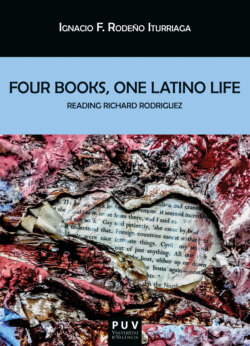Four Books, One Latino Life

Реклама. ООО «ЛитРес», ИНН: 7719571260.
Оглавление
Ignacio F. Rodeño Iturriaga. Four Books, One Latino Life
Отрывок из книги
FOUR BOOKS, ONE LATINO LIFE
READING RICHARD RODRIGUEZ
.....
This de-centering of the self leads Michel Leiris to parallel the examination of the self with the analysis of others. This triggers the concept that autobiography is an apostrophe, an address to the other, which presents the writer’s ideas to others in a communicative circuit. This is particularly evident in the case of serial autobiographies; that is, successive autobiographies by a writer that appear with a given cadence. This is the case of the writer in this study: Richard Rodriguez has published a new autobiography every ten years approximately. By addressing the others in an apostrophic manner, autobiography shatters the limits of the genre to particularized lives. Leiris, who is an ethnologist and ethnographer by training, helps understand how the “I,” by being subjected to the presence of the others, becomes the self of a community. Thus, personal autobiography can become the autobiography of a community, something that is of particular interest to underrepresented groups within the genre, namely the so-called “ethnic” communities. This brings about a particular problem; that of being both the subject and the object of the autobiographical discourse, which Roland Barthes explores in his autobiography. Other writers will explore issues of language and representation in their inquiry on the self, calling autobiography into question and attempting to demonstrate the impossibility of conceiving the genre in a traditional way.
Postcolonial and multicultural critics also propose alternatives to the traditional notion of self. This becomes germane to the analysis of autobiographies by non-mainstream authors. Calling Western norms of identity and experience into question, these autobiographers bring their status as the West’s “others” and their demand to be taken into account within the cultural discourse into the limelight. For these authors and critics, contemporary autobiographies are invested with a redemptive quality that is essential to the genre. These autobiographical acts construct subject positions through which to contest displacement and marginality, and posit a new subjectivity, based on its hybrid, transcultural, diasporic, and/or nomadic nature. These narratives of the self move the “I” towards the collective and challenge traditional boundaries of identification. Derridean deconstruction, Barthesian semiotics, and Foucaultian discursive notion of power are significant theoretical foundations.
.....